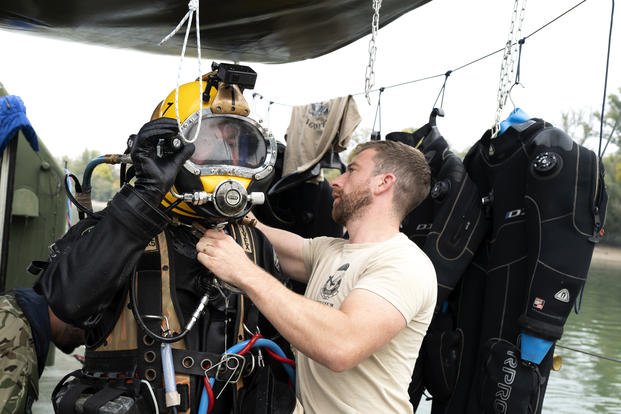
Soldiers from across Europe suited up in heavy diving equipment inside a cavernous flooded stone quarry deep beneath the Hungarian capital. Once their air tanks, flippers and waterproof diving suits were secured, they slipped beneath the cold water and, flashlights in hand, disappeared into the darkness.
The military divers from Belgium, Germany, Hungary and Lithuania were participating in an international training exercise in Budapest to prepare them for a variety of scenarios: recovery operations after a boat accident, rescues during a catastrophic flood, or the removal of unexploded underwater ordnance following an armed conflict.
“The most important thing is to strengthen our capabilities and work together internationally, underwater, and to know each other’s equipment, techniques and procedures,” said Maj. Csaba Horvath, the chief of the training exercise from the Hungarian Defense Forces 1st Explosive Ordnance Disposal and Riverine Guard Regiment. “That’s helping us to find and dispose of underwater munitions and explosive remnants of war.”
This was the second year in a row that Hungary hosted the 10-day exercise, which provided the soldiers with hands-on training in a variety of environments: diving 24 meters (79 feet) deep into the flooded passages of a former limestone quarry, submerging into lakes and caves, and facing the powerful current of the Danube River.
For Hungary’s EOD and Riverine Guard Regiment, such tasks are a daily routine. They are called around 2,000 times during a year to remove explosive materials from the Danube and other sites in Hungary.
The lasting impact of such unexploded munitions is being felt today in war-torn countries like Ukraine. Alexander Lobov, a military engineer and mine action expert with the U.N. Development Program, told UN News that 540,000 items of unexploded ordnance had already been cleared in Ukraine as of June of this year.
The Mines Advisory Group, a U.K.-based humanitarian and advocacy organization that finds, removes and destroys unexploded bombs and other munitions from places affected by conflict, says that “landmines and unexploded ordnance will threaten and endanger the lives of Ukrainian people for years to come.”
When the Kakhovka dam ruptured in southern Ukraine in June, it sent a torrent of water from the country’s largest reservoir into cities, towns and lowlands downstream on the Dnieper River. Minefields were inundated, raising the prospect that mines and other explosives were dislodged and carried into the Black Sea.
It is just such scenarios that make it important for the military divers to train in a variety of demanding environments, including in rushing rivers like the Danube. Speaking from a boat anchored in the middle of the river near Budapest’s Megyeri Bridge, Horvath said conditions there make detecting and removing munitions a particular challenge.
“Here we have a high rate of flow, a lot of current, and the visibility is very low, somewhere between 10 centimeters (4 inches) and one meter (3.2 feet),” he said. “It’s extremely difficult to dive in a very high-flow and high-current river.”
The strength of the current — the flow of the Danube near Budapest averages more than 2,300 cubic meters (2.3 million liters) per second — makes Europe’s second-largest river an ideal staging ground for preparing divers for extreme conditions, especially when such scenarios are difficult to replicate in their own countries.
Belgian divers suited up in vests weighted down with lead plates and boots made of metal to keep them anchored to the river bed as the current rushed by. Diving without air tanks in a fast water environment, they wore heavy metal helmets which were connected to the boat by a long air hose.
“You can feel it, you can feel the current, and you have to fight it going under,” said Staff Sgt. Tommy Lefrere, a salvage diver in the Belgian 11th Engineer Battalion who was taking part in the training. “It’s not something we’re used to doing in Belgium.”
Warrant Officer Laszlo Torok, Hungary’s only certified master diver, said putting the divers through such difficult exercises will help them to maintain their focus and sense of calm when they are called to act in real-world scenarios.
“It provides mental preparation for divers, which is extremely important in our work, to always remain calm and thoughtful,” Torok said.




